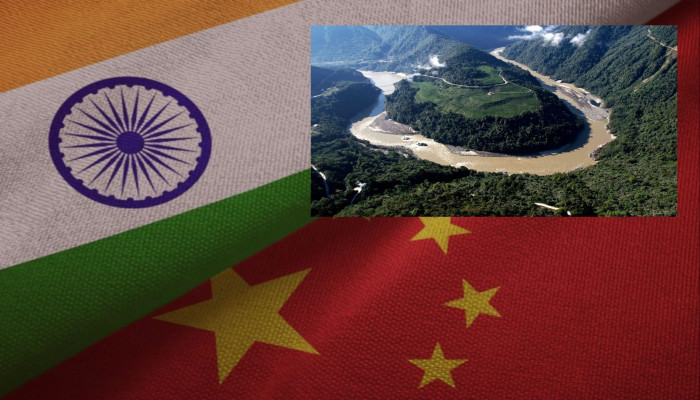India strongly protests China's Brahmaputra dam plan and establishment of two counties in Hotan Prefecture
- In Reports
- 11:37 PM, Jan 03, 2025
- Myind Staff
India has expressed a strong protest against China's recent decision to establish two new counties in the Hotan prefecture, emphasising that such actions cannot legitimise Beijing's "illegal and forcible" occupation of the region.
According to the Ministry of External Affairs spokesperson Randhir Jaiswal, parts of these newly created counties lie within India’s Union Territory of Ladakh. He reiterated that this move does not affect India’s unwavering stance on its sovereignty. The development comes shortly after the resumption of boundary talks between the two nations, which had been stalled for nearly five years.
"We have seen the announcement pertaining to the establishment of two new counties in Hotan Prefecture of China. Parts of jurisdiction of these so-called counties fall in India's Union Territory of Ladakh," Jaiswal said.
"We have never accepted the illegal Chinese occupation of Indian territory in this area," he said.
"The creation of new counties will neither have a bearing on India's long-standing and consistent position regarding our sovereignty over the area nor lend legitimacy to China's illegal and forcible occupation of the same," Jaiswal added.
He further said, "We have lodged a solemn protest with the Chinese side through diplomatic channels."
India has also raised concerns over China's proposed plan to construct a large dam on the Brahmaputra River in Tibet. In its initial response, New Delhi urged Beijing to take into account the interests of downstream states, particularly Arunachal Pradesh and Assam, which could be adversely affected by activities in the upstream areas.
"We will continue to monitor and take necessary measures to protect our interests," Jaiswal said on Friday.
There are growing apprehensions that the dam could disrupt the ecological balance in these states, as the Brahmaputra flows through both Arunachal Pradesh and Assam.
"As a lower riparian state with established user rights to the waters of the river, we have consistently expressed, through expert-level as well as diplomatic channels, our views and concerns to the Chinese side over mega projects on rivers in their territory," Jaiswal said.
"These have been reiterated, along with a need for transparency and consultation with downstream countries, following the latest report," he said.
"The Chinese side has been urged to ensure that the interests of downstream states of the Brahmaputra are not harmed by activities in upstream areas," he added.
On December 25, China unveiled plans to construct the world's largest dam on the Brahmaputra River in Tibet, near its border with India. The project, estimated to cost approximately USD 137 billion, will be situated in the ecologically sensitive Himalayan region. The dam is set to be built at a significant gorge in the Himalayas, where the Brahmaputra takes a sharp U-turn before flowing into Arunachal Pradesh and then Bangladesh. China's announcement has sparked concerns in both India and Bangladesh. However, last week, Chinese Foreign Ministry spokesperson Mao Ning sought to downplay these apprehensions regarding the project.
"The project will not negatively affect the lower reaches," she said, referring to the concerns in India and Bangladesh.
"China will continue to maintain communication with countries at the lower reaches through existing channels and step up cooperation on disaster prevention and relief for the benefit of the people by the river," she said.
The latest strain in India-China relations comes just weeks after the two countries resolved a border standoff that lasted over four and a half years and took steps to ease tensions. Following an agreement reached on October 21, both sides successfully disengaged troops at the remaining friction points of Demchok and Depsang.
On October 23, Prime Minister Narendra Modi and Chinese President Xi Jinping held talks during the BRICS Summit in Russia, agreeing to revive various bilateral dialogue mechanisms, signalling a desire to normalise relations. In their nearly 50-minute meeting, Modi emphasised the importance of managing differences and disputes effectively to maintain peace and stability in border areas.
Almost a month later, the Special Representatives on the border issue—India's National Security Adviser Ajit Doval and China's Foreign Minister Wang Yi—resumed talks in Beijing. This marked the first dialogue under the Special Representatives framework in nearly five years. During their discussions, Doval and Wang focused on fostering positive cooperation, including resuming the Kailash Mansarovar Yatra, sharing river data, and revitalising border trade.







Comments